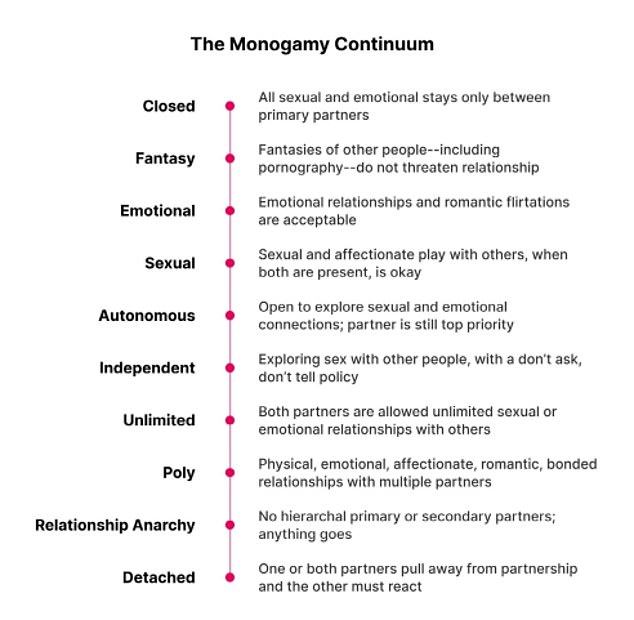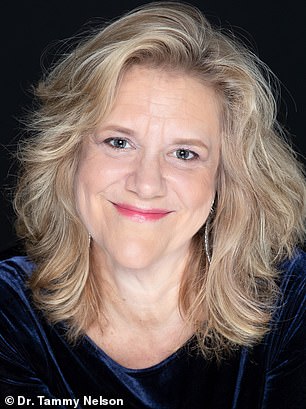There’s no denying that polyamorous relationships are becoming increasingly common in today’s dating climate, with many couples initially meeting online and feeling comfortable enough to be open about their preferences from the start.
Popular dating apps like Hinge and Bumble now offer users the chance to share their preferences on their profiles, with the latter offering the option of “ethical non-monogamy” to describe what you’re “looking for” in a potential romance.
But while single people are free to express the type of relationship they want to have, married individuals may not feel they are afforded the same luxury, and monogamy is generally considered the default relationship norm.
Traditional monogamy may work for many couples, but it’s not necessarily right for everyone and a new survey by the world’s largest married dating site, Ashley Madisonhas found that DNM (declared non-monogamy) relationships are becoming increasingly popular among couples.
The Monogamy Continuum, a concept created by an internationally renowned psychotherapist and sexologist Dr. Tammy NelsonPh. D, it’s something like a spectrum that provides a better understanding of the fluid nature of human connection and adult relationships, and is also a room for exploration.
The monogamy continuum could be the key to saving an unhappy marriage or relationship (file image)
With 10 different points on the continuum, individuals can identify where they land and better communicate their needs, not only to their partners, but also with others in their lives.
Speaking exclusively to DailyMail.com, Dr Nelson explained: ‘I call it open monogamy, rather than consensual nonmonogamy or ethical nonmonogamy, because I believe monogamy is nonbinary.
“It’s not that you’re traditionally monogamous and closed off, or totally open, polyamorous and anarchic. I think there are a lot of shades of grey in between, probably way more than 50, and way more than are on my continuum.
“But I think it’s a way for people to think about their relationships and processes, particularly in today’s technological world, what it really means to be monogamous in a way that works for them.”
The first point on the monogamy continuum is “closed,” which is when all sexual and emotional connection is maintained only between primary partners, while the second point, “fantasy,” means couples agree that fantasies about other people, including pornography, “do not threaten the relationship.”
The third point, “Emotional,” states that emotional relationships and romantic flirtations are acceptable, while “Sexual” means that sexual and affectionate play with others, when both are present, is okay.
The fifth point, “Autonomous,” is when couples are open to exploring sexual and emotional connections with others, but their partner “remains the top priority.”
If a couple opts for “Independent,” then they are free to explore sex with other people, “with a don’t ask, don’t tell policy,” while “Unlimited” means both partners are allowed unlimited sexual or emotional relationships with other people.

The monogamy continuum has 10 different points, including self-employed and polyamorous.

More and more couples are entering into non-monogamous relationships instead of cheating on their partners behind their backs (file image)
‘Poly’ is the eighth point on the monogamy continuum and allows someone to form physical, emotional, affectionate, romantic and bonding relationships with multiple partners.
‘Relational anarchy’ is described as the absence of ‘hierarchical primary or secondary partners; anything goes’, while the endpoint, ‘detachment’, is when ‘one or both partners withdraw from the relationship and the other must react’.
Highlighting the importance of communication when it comes to the monogamy continuum, Dr. Nelson said, “I think the key here is that since everyone has their own idea, it’s really up to the couple to decide, which is why I call it open monogamy.

Dr. Tammy Nelson is a sex and relationship expert, psychotherapist, and author.
‘It’s an open conversation. It should be a fluid and flexible agreement, because, for example, what I wanted when I was 18 is different to what I want now, at 60, and I think everyone should review it often enough, just like we have to renew our passport!’
“If you can have those conversations, you may never have to do anything, just talking about it might be enough, that might be sexy enough for both of you and you may never have to do anything,” she added.
The survey, which is based on 3,463 Ashley Madison members surveyed between May 22 and June 12, 2024, found that less than half (48 percent) of Americans identify as fully monogamous on the monogamy continuum.
The top two reasons people choose to be in a DNM relationship are the same for both sexes, but with a different emphasis, as the survey found that 43 percent of women wanted to increase the amount of sexual pleasure in their lives versus 57 percent of men.
Meanwhile, 24 percent of women said they had tried monogamy but it didn’t work out and they wanted to experiment with other options, compared to 17 percent of men.
According to the survey, women on Ashley Madison said the opportunity to get more of their needs met was the top benefit of DNM relationships, while men who use the app are more likely to choose a DNM relationship for greater sexual satisfaction.
Dr Nelson suggested that sometimes when one person has an affair it can be a kind of “wake-up call” for their partner, and insisted it does not have to be the end of a marriage or relationship.
“It can be the start of an honest conversation about what each of you wants in the relationship,” she explained.

Dr Nelson suggested that sometimes when a person has an affair, it can be a kind of “wake-up call” for their partner (file image)
‘When a couple strays, they’re not necessarily looking for someone else, they’re looking to be someone else. They want to feel something new. Their spouse or primary partner also wants to feel something new and better.
‘Creating a new monogamy agreement moving forward can breathe new life into a relationship. Instead of trying to go back to the old relationship you had before the affair, a new monogamy agreement can mean the beginning of a new way of talking and communicating, with new options, new potential, and a stronger relationship.’
But it’s worth noting that rules can help maintain healthy boundaries for people in DNM relationships.
Thirty-five percent of respondents said they had decided with their primary partner not to pursue romantic connections with people in their social circles, while 31 percent said they had boundaries set regarding emotional connections and only agreed to physical connections with others in their relationship.
Meanwhile, 37 percent said they followed a “don’t ask, don’t tell” strategy, where both partners were aware they were seeing other people but didn’t divulge details. And 17 percent said they didn’t have any rules in their relationship overall.
Dr. Nelson also stressed that couples “don’t have to be obligated to do anything” when it comes to disclosing non-monogamy.
“You can try it and then you can have another discussion and say, ‘You know what? This isn’t working for us.’ You don’t have to do it forever, you can just try things and then veto it,” he said.
When asked what she hopes couples will learn from the Monogamy Continuum, Dr. Nelson responded, “I’d like them to know that there are options for them. This isn’t your grandmother’s monogamy, you don’t have to have the same relationship that your mother had, or your grandmother had, or your great-great-grandmother had.
‘We’re in a new generation of relationships and you get to choose what you want your life to be like and no one else gets to decide. Whether it’s the two of you, or the three of you or whatever… maybe you’re single and you want to be polyamorous, you get to decide, no one gets to decide for you. Not your church or your government or your neighbors.
“We are really lucky today to have the freedom to make decisions, and many of the restrictions are in our heads and we have inherited them.”


